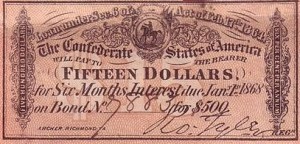Eight months into the war, as the year draws to a close, southerners are concerned about the economic prospects of the Confederacy, now isolated from the manufacturing muscle of the North. Slavery remains the economic underpinning of the South, but the region’s reliance on cotton, enabled by slave labor, is now suffering from an inability to turn raw cotton into products on any meaningful scale.
Southern politicians, investors, and businessmen are now casting about for the means to meet the industrial needs of southerners and shore up the South’s faltering economy. Elites and commoners alike keep daily stock on any new developments in this area. In most instances, such developments are small scale.
Like others, Baptists are concerned about the increasingly difficult times on the home front. Today’s Tennessee Baptist reports of glimmers of hope to the region’s Baptists. The paper also recounts a story designed to encourage southerners to adapt to economic hardship.
The mills of Messrs. Oaks & Wiswall, Lincolnton, N. C., are turning out the various kinds of writing paper—commercial note, letter, cap, and flat cap,–ruled and unruled, blue and white. We have a specimen of their “cap,” says the Salisbury Watchman, which is very good. . . .
The Atlanta (Ga.) Intelligencer says oil cloth is now being manufactured by Messrs. Manning & Wilborn, of that city, equal to anything we have heretofore received from the North.
A factory for the manufacture of printing ink has also been started in Atlanta.
The Charleston Mercury of the 13th says that “Messrs. W. W. & J. R. Read have now on sale, at their store, several pairs of ladies’ lace gloves knitted in Charleston. The idea of making up gloves for our market would never have been thought of if the Yankees had the means of supplying us. However, the Charleston made articles, though a first trial in the manufacture, is considered equal, in every respect, to the Northern glove. We also saw a knitted lace shawl, of superior fineness, also done up in this city.
The Charleston Courier states that a German is preparing to commence the manufacture of matches in that city.
The Columbus (Ga.) Sun says Mr. S. H. Bramhall, of that place, is constructing the paper machinery for cutting and finishing military letters, and will soon be prepared to fill orders for any quantity, either silver or gilded. . . .
We hear that the Tennessee Sewing Machine Co. will soon be able to supply machines at reasonable rates. . . .
We hope soon to hear of a score of calico and woolen mills going up.
——————-
Newspaper blankets are coming into vogue. They are no joke. A correspondent of one of our exchanges thus refers to the matter.
“I have recently heard much about the value of newspapers as a substitute for blankets, and have considered the statement to be apocryphal. But last evening I was induced to make the experiment. I took four full-sized newspapers and pasted them together by the edges, making one large sheet the size of a blanket. I then removed the blankets from my bed, and placed the newspaper sheet between the one remaining blanket, and the counterpane. The result was a comfortable night’s sleep, without any feeling of cold. I pledge my word to you, gentlemen, that this is literally true; and my object in making the communication is, that through the medium of your paper, the fact may be generally circulated; for it is no trifling matter to the poor to know that for an outlay of a few pennies they can supply themselves with comfortable bed coverings….
Home front struggles in the South are only just beginning. The Confederacy’s early battlefield victories will not translate into regional prosperity. Few, Baptists or otherwise, can anticipate what hardships await in the years ahead.
Source: Tennessee Baptist, December 7, 1861 (link); image (link)



